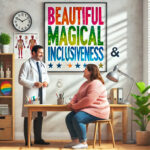Euthanasia and Eating Disorders

Euthanasia and Eating Disorders
Euthanasia, or voluntary assisted dying laws, must not be considered a solution for a person with an eating disorder. I will proceed to explain my position on this life and death issue.
Instead of death as a solution for people with eating disorders, I urge us all to focus on hope, faith, trust, life quality, freedom, independence, peace. Let’s remember that although eating disorders have extremely high death rates and cause often intolerable suffering, they are not a terminal illness. They are a treatable illness.
The trouble when you have an eating disorder is that it wants you to die. For it, death is an ultimate win. We must take a stand, fight and neutralise this illness! Every person I know whose eating disorder led them to beg for death, is grateful that people around them rallied at that critical point, took control of their safety and their life when their illness rendered them unable to do so, until they were sufficiently self-restored and could resume control themselves.
It is of deep concern in the eating disorder field that in some parts of our world, medical practices are moving closer to helping people die when they want to. And for this to extend to people with eating disorders, would be tragic.
It is getting close to home.
On June 19 this year, my home state of Victoria became the first state in Australia to join few countries in the world to pass voluntary assisted dying laws. The Voluntary Assisted Dying Act (2017) claims to provide a safe legal framework for people who are suffering and dying to choose the manner and timing of their death.
The government website describing the process for accessing voluntary assisted dying in Victoria states this process is the safest and most conservative in the world.
Mental illness or disability alone are not grounds for access to voluntary assisted dying, but people who meet all other criteria, and who have a disability or mental illness, will not be denied access to voluntary assisted dying.
Given a chance, I would have grabbed euthanasia
I find this legislation provision regarding mental illness deeply disturbing. A person with an eating disorder often has co-morbid challenges. Besides anorexia nervosa, I had chronic anxiety and depression, Post Traumatic Stress Disorder, and ongoing physical challenges from serious road trauma. Many a time, in my 20s and 30s, I wanted to die and If I had been able to choose euthanasia, I would have grabbed it.
My eating disorder of more than 20 years at the time had taken a lot, including my family of origin and my marriage, and it would have presented many plausible reasons to doctors on why it should complete its progressive destruction and take my life too. When an eating disorder is running riot in our brain, death can beckon as the only way out of the dark, relentless, tormenting, torturing, nightmare.
We must not allow this to happen.
We need to focus on life and living
Eating disorders are a treatable illness.
- We don’t need laws that allow people with eating disorders to die. We need laws that help people with eating disorders to live.
- We need new, more holistic, recovery models of care that put the patient first and are based on compassion, respect and non-judgment.
- We must stop punishing and traumatising people for not eating. We must stop telling them that they are selfish, rude, non-compliant, deceitful and manipulative. I have yet to meet a person with an eating disorder who is any of those things. It is their illness that is selfish, rude, non-compliant, deceitful and manipulative.
- Hospitals must stop discharging people and sending them home in shame with the ‘non-compliant’ label. Instead let us work together to develop new treatments that nurture self-belief, that helps the patient, no matter how sick, to feel respected as a human being.
- Re-nourishment is crucial in healing from an eating disorder but even this can be achieved in a way that is compassionate and respectful of the patient.
- We need less emphasis on weight and more on enhanced quality of life for those who have suffered for a long time. Such focus, of being treated ‘like a normal person’ can be helpful in learning to trust and strengthen the healthy self. Patients like to feel they are consulted, that they have choices, and are part of the solution. We all need to feel that at least a little bit of us is ‘okay’ and we all need something to look forward to.
- Recovery is much, much more than a figure on a scale. Physically, a person may look fine and be considered ‘recovered’, or not sick at all, when in fact their illness remains rampant in their brain, causing great internal distress. Remember that the brain can recover but it needs time, a lot of time, depending on the illness severity and the length of time the illness has been embedded within.
- When I was weight restored but continuing to struggle with regularly eating three meals and three snacks a day (eating too much or too little), an insightful dietician, Belinda Dalton, encouraged me to ‘focus on taking care of my feelings’ and ‘the food will take care of itself’.
- Food had dominated my brain for so long I had to consciously learn to think and feel about other things. The wonderful Prof. Janet Treasure once mentioned that it takes more than 9000 repetitions to retrain a thought. However many times it takes, I agree with the need to persevere, because our brain is an amazing organ and at every age, we can develop new, healthy-self thoughts and feelings. From my own experience I firmly know and believe this.
- People with eating disorders do have feelings. Remember they are there, inside, scared, wanting to come out and break free from the chains of their eating disorder. Help them to reconnect with these ‘healthy self’ feelings and rather miraculously, over time, food will become less of an issue; the nasty eating disorder voice will fade; food will cease being a constant cause of guilt, anxiety and fear, and the person will blossom as they explore the full potential of their life.
- Never, ever give up.
Recovery is possible at every age
We know today that recovery is not confined to the young – that we can recover at every age from an eating disorder. I was not expected to recover – yet at 55 I broke free from the anorexia nervosa that developed in my brain at age 11.
I am eternally grateful to the health professionals who kept their doors open and encouraged perseverance, even when they had no understanding of my illness or any idea of how to ease my pain. They treated me with respect, patience and gentle encouragement. They always instilled hope and trust. Gradually, bit by bit, the eating disorder’s ironclad hold and dominance was weakened.
In the 13 years since becoming more ‘healthy me’ than ‘eating disorder’, and being free to eat my three meals and three snacks daily, I have written 10 books, completed a Ph.D., enjoyed countless happy family times with my four children and their dad, become a grandmother to five gorgeous children, ‘mother’ to two delightful cats and English Staffordshire puppy, and delight in mentoring and helping people tell their stories through narrative writing.
Decades of incarceration are not forgotten. Of course they have scarred, shaped and influenced my life. Some losses cannot be retrieved. Some pain, especially with the relationship loss, is ongoing. However, I focus on the joy of life. And life is beautiful.
The bottom line
My bottom line is that I am glad I did not succeed at attempts to end my life. Likewise, every person I have met who has attempted to end their life, is grateful they did not succeed. Because while there is life, there is hope, and we all come to discover that indeed, life IS beautiful and bountiful.
Likewise, every family I speak with, who has lost a family member who has taken their own life due to the complications of their eating disorder, has a sorrow that won’t go away. For their child, sadly, there is no hope, no chance of beautiful life. Often these bereaved families find comfort in helping to give hope to other families, other children, with the same illness. Urging them to hold onto hope. Onto life. Because the loss of one life to an eating disorder, is the loss of one life too many.
F.E.A.S.T. Statement on Euthanasia and Eating Disorders
Which brings me to families of people with the illness – these families need more support too. An eating disorder is described as a family illness and ideally the entire family is involved in the recovery process. Together, and collaboratively with health professionals, we can confront the difficult issues surrounding eating disorders, not only in our homes but in our communities and the wider world.
As a member of the F.E.A.S.T. Advisory Panel, I applaud the FEAST Statement issued this week on Euthanasia and Eating Disorders. I encourage you to join discussion with to be discussed live with F.E.A.S.T. on Facebook on July 11.
- If you find this discussion on euthanasia upsetting, in Australia you can receive telephone support and counselling by calling the following numbers: Australian Centre for Grief and Bereavement tel. 1800 642 066 and the Lifeline tel. 13 11 14
- If you live in the United States, the National Suicide Prevention Lifeline is 800.273.8255 and a listing of worldwide health emergency/crisis help lines can be found here.





